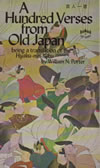
D. Sources of Influence and Transmission
20. Porter, William N. Translations 1909~14.
 |
||
| A modern edition of the last rhymed translations of Japanese poetry that would not have seemed immediately outdated to modern readers. |
Porter’s translation of the Hyakunin isshu [Ap], A Hundred Verses from Old Japan (Oxford: Clarendon, 1909) includes romanised Japanese on pages facing the rhymed and metered English versions, which would have had the unintentional effect of demonstrating unambiguously to readers inclined toward free verse that the Japanese originals relied on techniques quite different from those of translators such as Dickins (D3), Chamberlain (D5a), Aston (D13), and Porter himself, who rendered them in conventional English forms. The practice had been called into question indirectly in the free verse translations of Hearn (D9b), Hartmann (see D12 and 12e), and Noguchi (D15e1-7), but it would take Pound to render the style anachronistic in an instant, with the publication of Cathay (BK15). Mathers (D25) and Miyamori (D27) carried the tacit debate into the twenties and thirties, but Porter’s are the last rhymed versions of Japanese verse published in England or America that would not have seemed immediately out-of-date to many of their readers. The Hundred Verses has been shown by several writers, most notably Seaver (A17) and Miner (A25), to have been a source for Crapsey’s ‘cinquains’ (see CA4), though Kawanami (noted at CA4) demonstrates that Crapsey relied more directly on Revon (see D21). Kodama (A59) argues that the work also was the source for poems by Lowell, particularly FROM CHINA (BI4e, and see also BI5 and BI8v). The work is mentioned in passing by Blunden (BD47), and its general influence, along with that of Porter’s haiku translations, A Year of Japanese Epigrams (London: Oxford UP, 1911), is discussed by Schwartz (A18). Two other Porter translations from the Japanese, The Tosa Diary (London: Frowde, 1912, from Ki no Tsurayuki’s [Ap] Tosa nikki) and The Miscellany of a Japanese Priest (London: Milford, 1914, from Kenkô’s [Ap] Tsurezuregusa) were in Yeats’s library (see BL228). See also BB3a.

